#Ψάπφω
Text
Sometimes at sunset the rosyfingered moon surpasses all the stars. And her light stretches over salt sea equally and flowerdeep fields. And the beautiful dew is poured out and roses bloom and frail chervil and flowering sweetclover.
Sappho, from If not, winter: fragments of Sappho (trans. by Anne Carson)
#sappho#anne carson#if not winter#fragments of sappho#fragments#ancient greek poetry#moon#stars#rosy fingered moon#sometimes at sunset the rosyfingered moon surpasses all the stars#if not winter: fragments of sappho#Σαπφώ#Ψάπφω#rosy-fingered moon
444 notes
·
View notes
Text
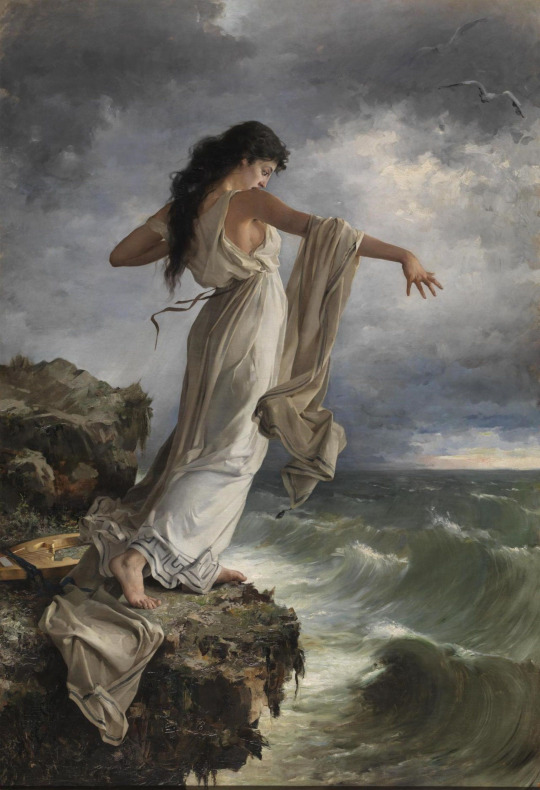
La mort de Safo, per Miquel Carbonell i Selva; 1881.
#art#pintura#Safo#Σαπφώ#Ψάπφω#Safo de Lesbos#Miquel Carbonell#Miquel Carbonell i Selva#art català#Catalan art#1881#segle XIX
9 notes
·
View notes
Text
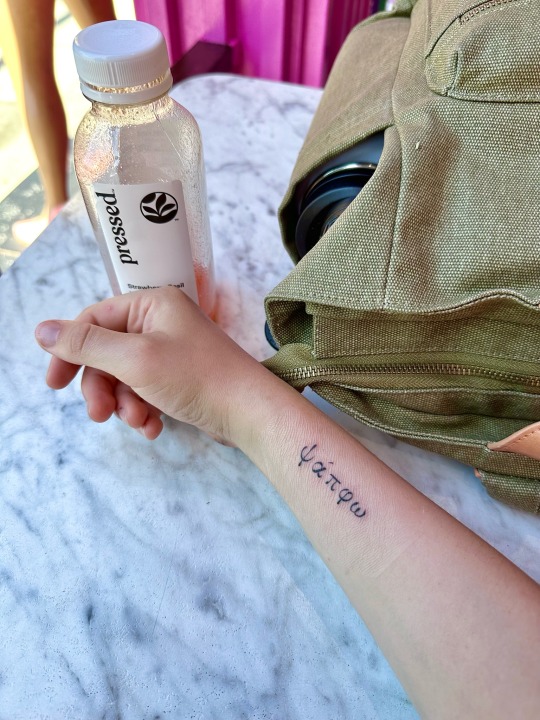
Ψάπφω-
the way the ancient Greek poet, Sappho of Lesbos, likely would have written her name. I got this new tat last week on a research trip to study her impact on the queer community, now she will be with me always.
#sapphic#sappho#lesbian#poetry#writing#poetsandwriters#poems#wlw love#queer history#aesthetic#tattoos#beautiful#lgbtq#lgbtq community#women’s history#ancient greek language#greece
78 notes
·
View notes
Note
Sorry for sending you so many asks, but I can't help it (these are all extremely intriguing questions): Ψάπφω- what piece of lost literature do you most wish you could read?
no need to apologize :)) this is fun!
i know it’s cliche but i wish i could read all the writings of women that were lost and never written because we were not allowed to read or write.
but also linear a because we have so many texts and the knowledge is right there but we’ve just lost the ability to understand it???
also the lost stories of zelda fitzgerald would be fascinating to read
classics asks!
2 notes
·
View notes
Text
Dramatic epilogue scene for a gay couple: Speaking the sappho lines into the sunset, while their civilisation unravels around them. Does it mean the lovestory? does it mean their culture? Who knows, but it’s beautiful and it’s gay.
2 notes
·
View notes
Text
Who Was Sappho? 📜
Greek • Σαπφώ Sapphō
Aeolic Greek • Ψάπφω Psápphō
630BC to 570BC

THE POET
Known by names such as The Poetess (to Homer’s The Poet) and The Tenth Muse or Mortal Muse, Sappho is highly regarded as one of the greatest lyric poets of antiquity. An Archaic Greek poet from the island of Lesbos, Sappho has been widely popular and influential despite only fragments and three mostly-complete poems surviving to this day.
As a lyric poet who composed extensively throughout her life, her poems were written to be sung and played accompanied by a lyre, and were taught orally. No fragments currently exist that were written down by Sappho herself. All current known fragments are dated well after her death. Found preserved on papyrus, parchment, potsherds and quoted by various other ancient writers, less than 700 lines of her poetry have been found and identified today. This is due in part to insufficient demand for her works to be copied to parchment from papyrus in ancient times, to public destruction of her work, and to the obscurity of her Aeolic dialect. The Library of Alexandria collected and arranged her works into 7-9 volumes, and so it is believed the collection must have contained around 10000 lines of her poetry. Some findings from volume one of this collection have been amongst the most recent fragments uncovered and identified.
According to Wikipedia:
Sappho's poetry is known for its clear language and simple thoughts, sharply-drawn images, and use of direct quotation which brings a sense of immediacy. Unexpected word-play is a characteristic feature of her style.
While Sappho is best known for lyric poetry, according to the Suda she also wrote epigrams, elegiacs, and iambics, but these are mostly lost to us. For her verses she used what is now known as the Sapphic stanza, a specifically Aeolic verse of four lines. Both Sappho and her peer Alcaeus used this stanza in their works, which tends to flow much easier in Attic or Aeolic Greek or Latin than English. She is also credited with the invention of the pektis, a pear-shaped harp or lute-type instrument.

THE WOMAN SAPPHO
No full physical descriptions or depictions of Sappho survive today outside of artists impressions. She has stated in her poetry that she once had black hair, and her peer Alcaeus also calls her "violet-haired," which is said to mean dark or black haired. It is assumed from the context of her poetry, her known peers, and her family's later banishment from Mytilene due to unknown political or social happenstance, that she was from an aristocratic family. Her family includes: father (unknown, 10 possible names), three brothers (Erigyius, Larichus, and Charaxus), possibly a daughter named Cleis (tentative translations of Fragment 132), and her mother Cleis (antiquity assumes her daughter was named after her mother). The name of her (possible) husband, identified in the Suda as Kerkylas of Andros, is uncertain. The uncertainty lies in the translation of the name itself - roughly, Dick (Penis) of Man Island. While not impossible, highly improbable when you look at how often the life of Sappho was the butt of jokes since antiquity.
The topic of Sappho's sexuality and love-life has been debated for centuries. She was supposedly married, wrote poems about men and women, wrote poems about loving men and women, and her poems about women were passionate and erotic enough to catapult her into infamy and lead to the creation of the terms sapphic and lesbian. Her sexuality is still in heavy contention today. So, if labelling Sappho's sexuality is important to you, have a read of the various translations of her works and decide for yourself.
THE POPULAR WORKS
If Not, Winter by Anne Carson
Stung With Love: Poems and Fragments by Aaron Poochigan*
Sappho, A New Translation of the Complete Works by Diane Rayor*
Sappho by Mary Barnard
The Love Songs of Sappho by Paul Roche
*includes most recent identified fragments/poems
Sources and Links:
In Another Time image
Wikipedia
Sappho by Diane Rayor
If Not, Winter by Anne Carson
Sappho As the Tenth Muse
64 notes
·
View notes
Photo


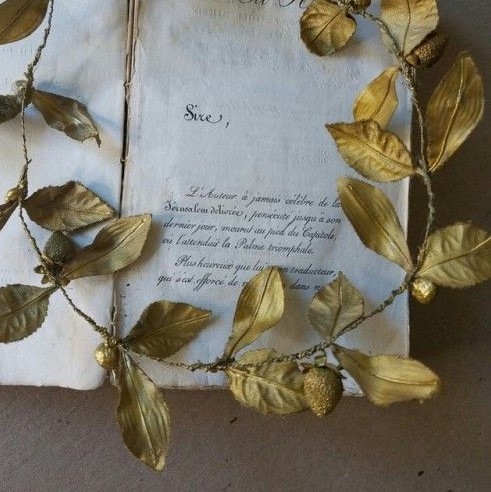


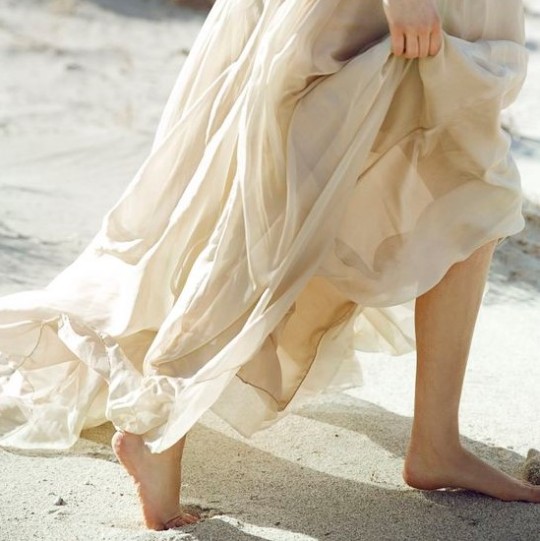
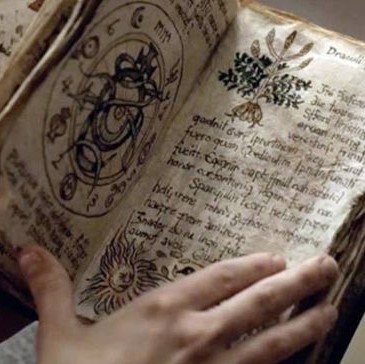


admirable women [1/?]: Sappho,
Sappho, ancient Greek Ψάπφω (Psáppho) was a poet from the island of Lesbos.
During her lifetime she was already considered as one of the greatest poets ever lived, best known for her lyric poety. From her approximatly 10.000 lines only one complete poem survived (Ode to Aphrodite).
Apart from her poetry she is also a symbol of tragedy, unrequired love and desire between women.
755 notes
·
View notes
Photo

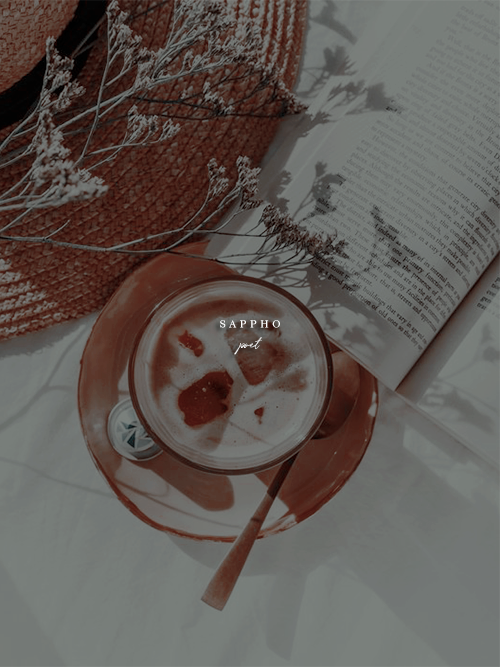


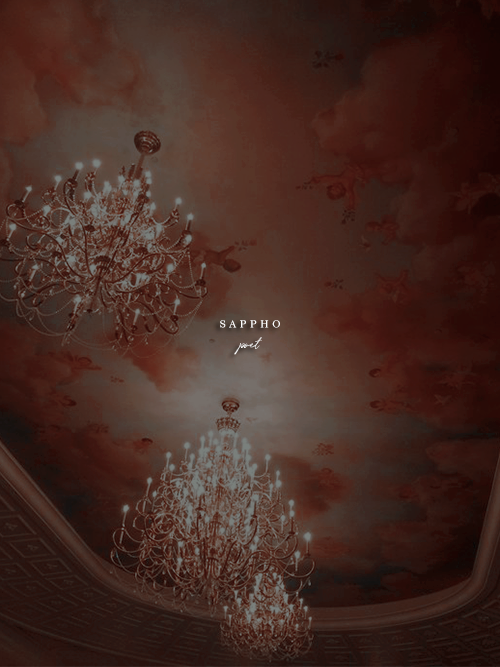
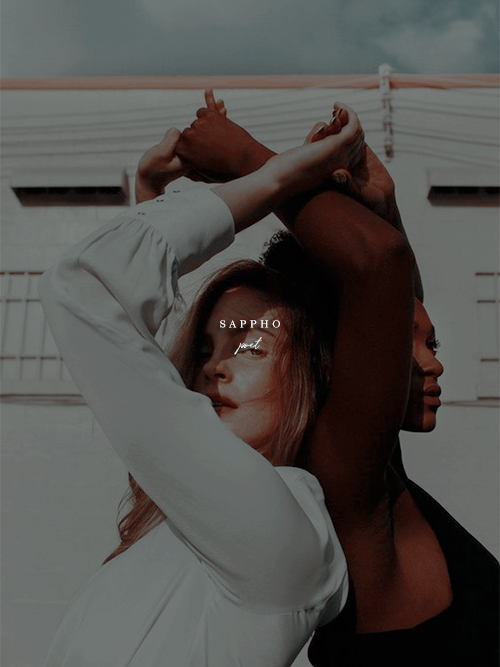
kelsey’s mythology family ○ sappho
[for @bwidow]
❝ sappho (Ψάπφω) was an archaic greek poet from the island of lesbos. she is known for her lyric poetry, written to be sung while accompanied by a lyre. ❞
#sappho#greek myth edit#sappho edit#greek mythology#bwidow#usermanvi#edit: mine#edit: posters#misc: mythology#friends: bwidow
392 notes
·
View notes
Text
The Sellout, chapter five
five: the changing levels
Kyra awoke with something hard jabbing into her thigh. She pulled the sharp corner of a book away from her leg, and blinked back the veil of sleep while she regained her bearings. The chair she sat in was uncomfortable and unfamiliar, and she shifted positions, feeling wool under her fingertips, concrete under her feet. She was still in Kassandra's condo, and this hadn't been some stress-induced dream.
The owner of the book and uncomfortable chair and concrete floor was still sleeping on the couch nearby, blissfully oblivious to her presence.
Kyra glanced out the windows. What time was it? The skies outside were chalkboard black, the city winking back at her through the glass. She touched the screen of her phone awake. Two-thirty in the morning. Opening the shop in three hours was going to suck.
She only had herself to blame. She was the one who'd offered to drive Kassandra home. She could have ignored Kassandra's protests and called an ambulance. Let the EMTs haul her away. Problem solved.
That there was a problem to be solved at all was also Kyra's fault. She'd left the front door unlocked, and the shop's bright lights had drawn that tweaker inside with the gravitational pull of the sun. If she hadn't done that, he wouldn't have been able to attack her, and Kassandra... Kassandra wouldn't have put herself in danger by stepping into his path instead.
The incident took no more than a few seconds. Kyra's memory of it flickered past in still frames from a blurry video, but there was no mistaking the central figure in each one.
Kassandra.
She'd done Kyra a reckless, foolhardy kindness, despite Kyra's best attempts to give her every reason not to.
Kyra looked at Kassandra again. She really was gorgeous, stretched out like a slumbering lion across the couch. Kyra shook the thought away and studied the book in her hands, with its thick cover and mix of heavy paper and vellum pages, hefty for an otherwise small volume. Anne Carson's reimagination of Antigone. I like a good argument, marrow versus marrow...
The moment Kassandra had fallen asleep, Kyra had gone to the bookshelves and found a collection of tomes as tasteful as everything else inside this concrete box of a condo. All the titans were there, from Atwood to Zola, Booker prize-winners rubbing covers with Pulitzers, their spines uncreased and bookstore-fresh.
None of the books had been read. It was as if Kassandra had arranged to fill her bookshelves with a cross section of capital-L literature without bothering to crack them open even once. Kyra had a vision of Mars as seen through an old telescope, its surface cloaked with dark expanses once mistaken for seas until closer inspection revealed them to be as barren as the rest of the planet.
Kyra had rolled her eyes at the fakery, but then her gaze snagged on a book unlike the others, and she realized that her first glance may not have been entirely accurate. Then curiosity took over, which was how a copy of Antigonick had ended up in her hands. Apparently, there was life on Mars after all.
With hours to fill, she'd settled in and started reading, flipping pages in a book so worn that its cover flopped open flat on its own.
Now it was two-thirty in the morning in Kassandra's home, with Kassandra's book in her lap, and she remembered how the Greek chorus in that book sang accusingly at the god of desire: You change the levels of a person's mind.
She stood up abruptly. She returned to the row of shelves, slid the book back where it came from, and studied the others, looking for signs of wear, looking for signs of life.
She was snooping and she didn't care. Kassandra slept on, none the wiser, as Kyra found worn covers on predictable heavyweights like Wolf Hall and The Prince mixed with surprises like Chiang's Stories of Your Life and Others and a copy of the Meditations of Marcus Aurelius that was so tattered from use it nearly fell apart in her hands.
She never would have thought Kassandra a stoic. Spartan maybe, given the simplicity of her surroundings, but not stoic.
The surprises kept coming: in the amount of poetry contained in Kassandra's shelves and in the fact that the poetry was more likely to have been read than the prose. And then Kyra hit paydirt, in a heavy, library-bound tome with "Ψάπφω" embossed on the cover, filled with pages of photographic reproductions of what looked to be papyrus fragments.
And in the margins of each page were annotations written in a forceful, propulsive scrawl. English mixed with what looked like Greek. Kyra would have to take the words written in English at face value; despite her Greek heritage, she'd never learned the language or any of its ancient forms.
among mortal women, [know that?]
you could release me
from every care
Kyra couldn't read the book's title, but she still had a good guess what it was. She turned the page, then the next, skimming translation after translation, some crossed out, others given a second attempt, and then she spotted one that leapt off the page:
someone will [did??] remember us
I tell you
in another time
The book in Kyra's hands was Kassandra's attempt at translating Sappho.
If studying Kassandra's bookshelves was snooping, this suddenly felt like reading her diary. Kyra shut the book, the covers closing with a loud snap, and she winced and held her breath while Kassandra stirred on the couch.
A momentary rustling, then silence again. Kassandra hadn't woken up. Kyra returned the book to its home on the shelf and went to the windows. There wasn't just life on Mars, but an entire hidden ecosystem, and now having discovered it, she wished she could forget it existed.
She frowned into the darkness. Somewhere to the east, Mount Hood was waiting until dawn to make its grand entrance onto the cityscape. Kassandra's view would be spectacular, as a view from a penthouse should.
Kyra's frown deepened. Penthouse. "PH" in the private elevator that serviced a private garage. Follow the trickle of money down to the space-age car, the hand-tailored suits, the twenty-dollar lattes. She'd missed the obvious, over and over.
A place like this couldn't be bought with a VP's salary — even one at Starbucks. It would take real money, fuck-you money, the kind of money that cascaded from one generation to the next in an endless flow. Kyra looked back at the couch and the woman sleeping upon it.
Kassandra wasn't just rich — she was fucking wealthy.
It made sense now: the careful curation of Kassandra's social media, the steady stream of favorable press, her reluctance to call the cops. It was how someone with vast amounts of money could hide in plain sight, floating through life without needing a security detail to protect her from the crazies like Bezos and Gates did.
But with all that money, why did she even bother with work?
Kassandra would take Kyra's shop, not because she needed to make a living, but because she simply could, and it didn't matter if she liked Marcus Aurelius or read poetry or translated Sappho. She'd do the job and Kyra wouldn't be able to do a damn thing to stop her.
Kyra didn't belong here. Maybe in another time things could have been different. In this one...
She walked across the room and knelt by the couch. "Kassandra. Hey."
Kassandra's eyes blinked open.
"You alive?"
"No," she said, then smiled. "Yes." She glanced around the room. "What time is it?"
"Almost three."
"Shit. I'm sorry." She sounded like she meant it.
"What time's your alarm set for?"
"Five-thirty."
Good. Kyra wouldn't need to stay much longer. "You've lasted this long, you'll probably survive to hear it."
The smile faded. "You sound disappointed."
"Get some sleep," Kyra said. "Five-thirty's coming up fast." She got up before Kassandra could answer, moved back to the chair, sat, and tried not to think of anything while Kassandra's gaze bore down on her with the weight of a hydraulic press.
It took forever before Kassandra's breathing finally relaxed and deepened with sleep, but when it did, Kyra quietly moved across the room and slipped out the front door. Her debt to Kassandra's inexplicable gallantry was paid in full.
The elevator whisked her to the building's lobby, an airy chamber of blonde wood and minimal metal, warm and smelling faintly of lavender. Then she pushed open the glass door, stepped into the cold, damp, river bottom air of the real world, and left Kassandra and her gleaming tower far, far behind.
.oOo.
Eleven o'clock and the Sunday morning brunch rush was still underway. The flow of customers had been steady since she'd opened at six, but as nice as it was to ring up sale after sale, she was running on fumes.
Pete could tell. They'd bumped elbows once and had a few near misses behind the bar, and after that he kept giving her sidelong looks.
She was pulling a shot under his watchful gaze when her patience with him finally frayed. "Say whatever it is you want to say."
"Take a break after this drink. Fifteen minutes would do you good."
And give every person standing in line an excuse to whine on Yelp because their drinks took a few minutes longer than they wanted? "Not yet."
"When?"
She lifted the pitcher of steamed milk, then stopped just before the pour. Her hands were shaking, and she couldn't get them to stop.
He stepped into her space, his bulky powerlifter's body towering over her, and gently took the pitcher from her hand.
She watched silently as he finished the drink for her, and when stillness returned to her hands and forearms, she picked up a to-go lid from the stack and gestured for him to put the drink down on the counter. "When Phoibe comes in," she said.
"Kyra..."
She snapped the lid onto the cup and handed it to the customer waiting on the other side of the counter.
The man sipped his drink and gave her a grateful nod, now fortified with enough caffeine to wait two hours in line for a seat at the diner up the block. Pete was already talking to the next customer, but before he could tell her what to make, a flash of color pulled her eyes to the front door.
A tiny, black-haired Korean woman bustled into the shop, dwarfed by a sprawling bouquet of flowers in her arms. Every eye in the shop turned to watch her walk up to the counter. "Are you Kyra?" she asked.
"Yeah."
"For you, lucky girl." She placed the glass vase at the edge of the counter and stepped back to inspect her work.
Kyra's hand slid into her back pocket for her wallet, but the woman wagged a finger at her and said, "No, no. All taken care of. Enjoy." Then she smiled brightly and disappeared out the door.
Kyra eyed the slice of meadow that had appeared as suddenly as spring: sprigs of white serviceberry blossoms hovering over matte green leaves, pink clusters of sea blush, all nestling contentedly in a bed of ferns, the serrated fronds twined with sweetpea vines in full bloom.
They were the real life inspiration for the tattoo that wound around her right arm, every plant and flower growing wild in Oregon. They'd greeted her every spring, after Nia had taken her in and they began spending the warmer months up at the homestead in Estacada, its lush forest and sparkling river a shocking change of scenery to a gutterpunk who grew up in the grey grime of Portland's streets.
A card peeked out from the greenery, its handwriting familiar. She could almost hear Kassandra saying its words out loud.
Thanks for the ride home — and for looking out for me.
-K
Kyra's ears buzzed and her head swam dizzily as she floated on a curious feeling of elation. Then she blew out the breath she'd been holding. It was the lack of oxygen making her feel loopy. That's all.
So Kassandra was observant. All hunters were. And Kyra would be a fool to think otherwise, that this was anything other than a ploy to soften her up.
Kassandra would be back. The only question was When?
.oOo.
It wasn't Monday, Tuesday, or Wednesday, and after Thursday crawled by and Kyra had begun to hope that maybe, just maybe, her prayers had been answered and Kassandra had moved on to richer hunting grounds, the door to the shop clanged open five minutes before close.
This time, she didn't even turn around when Kassandra walked up to the counter. She just kept spinning the cup in her hand against the towel she'd been using to dry it off. "How's your head?" she asked.
"Much better, thanks."
She put the cup away with the rest, then turned to Kassandra, noting her lack of suit jacket and the extra button open at the neck of her dress shirt. Working late, perhaps. "I got the flowers."
"Good." Kassandra's face gave nothing away, her answer too short to offer any clues about the purpose of her visit.
"They were beautiful," Kyra said. "Where did you find them?"
"I've been exploring the city in my off hours. Sometimes I end up at a farmers' market and find a Korean family selling the most amazing wildflowers. Sometimes I end up in coffee shops where I find more than I bargained for."
Kyra tossed the towel next to the rack of cups. "Why are you here, Kassandra?"
"You keep asking me that."
"You never give me a good answer."
"I like the way you make coffee."
Kyra folded her arms.
"Ahh, you're not really asking about me then," Kassandra said with an air of amused patience.
She'd guessed wrong, but Kyra didn't correct her.
Eventually, she sighed into the silence. "Like I said, a new flagship store. That's the plan."
"There's already one in the Pearl." A massive shop, three stories high, a layer cake of espresso counters and seating and retail encased in a shiny frosting of glass and steel.
"Seattle has more than one, San Francisco does too. Time to add another on this side of the river. Little Portland's growing up."
Kyra stepped out from behind the counter. This time, she locked the front door before doing anything else. "You'd be better off at the Convention Center than all the way down here," she said over her shoulder.
"Probably. But I wouldn't be doing my due diligence if I didn't know the landscape of the entire east side." Kassandra moved to the windows and began helping flip stools onto the bar. "My offer still stands, by the way."
Kyra stopped mid-flip, then put the stool in her hands back down on the floor. "Suppose I said yes. What do you think I'd do with myself then?"
Kassandra didn't have a ready answer for that. She tilted her head, squinting at Kyra as she thought. "I don't know," she said. She seemed surprised by her own admission. "Take a vacation?"
"You're damn right I would. Someplace nice and sunny with enough five-twelve routes to keep me climbing for weeks. And afterwards, I'd come home and... what then?" She ran her hand along the bar. Ten years ago, she'd rescued the oak plank from the collapsing ruin that had once been the homestead's workshop. She'd attacked it with a sander, finished it with shellac, installed it against the window with her own hands. "Selling this place would net me — what, a hundred thousand if I'm lucky?" Ten years of work, only to end up with less money than she'd started. "That money won't last forever."
A rattle at the front door turned both their heads at the same time. A woman stared back apologetically through the glass. Just someone looking for a last-minute caffeine fix. Kyra mouthed a Sorry and nodded up at the inert neon sign above her head.
"You could open another shop."
"And bust my ass starting over from scratch while waking up every day wondering if today's the day another suit like you is going to show up? That sounds fun." She was tiring of this conversation. "But worrying about things like that isn't something you'd understand."
"What do you mean?"
"How much does a gallon of milk cost?"
Kassandra's eyes narrowed. "Between three and five bucks a gallon around here. I know the price of bananas too in case you think I'm too out of touch to know that either."
The question had pissed her off. Good. Maybe she'd go away sooner. Kyra started sharpening another volley of words, knowing that Kassandra would raise her shield, and look at her with that mirror-finished glint in her eyes she'd used to turn Kyra's pointed remarks aside before. Kyra's heartbeat sped up, ready to rise to the challenge.
Instead, Kassandra's shoulders sagged and a strange expression slumped across her features, one that took Kyra several moments to identify as hurt. It scattered Kyra's snark, and left her with a pounding heart and nothing to say. She stared at Kassandra as the silence grew second by second, and when she was finally able to muster some words, they snuck out from her with a weary softness. "You didn't come here to talk about work, did you?"
"No." Kassandra turned away, straightening the stool she'd lifted onto the bar so its edges were lined up square. "I was hoping to get your help with something."
It was bait. It had to be. The longer Kyra let this conversation keep going, the more likely it was that she'd do something stupid. "My help with what, exactly?" she asked, while her brain howled in frustration.
"I've been invited to a... gala of sorts."
Kyra didn't like where Kassandra was going with this. "A gala," she said flatly. "Like ballgowns and dancing?"
"Not really. More like Patagonia fleece vests and fat wallets bumping into each other."
"And?"
"Will you come with me?"
"I think you're asking someone from the wrong social strata."
Hurt flickered through Kassandra's eyes a second time, but she smoothed it over with a faint smile and didn't miss a beat. "On the contrary, you'll fit in better than you think. It's a fundraiser for the Multnomah County Library."
"Surely I'm not the only person you know who reads books."
"You don't just read books. You climb."
An oddly specific combination. "You're plotting something."
"Nothing shady, I promise. Just come with me and talk to people. It'll only be a couple of hours — and there'll be an open bar."
Kyra was half-tempted to lie and say she didn't drink. "You actually think I'll say yes to this? I don't even—" Like you, she meant to say.
"It'd be an excellent opportunity to expand your network," Kassandra said, but then she shrugged off her own suit-speak with a grin. "Anyway, the Library wants to build a new children's wing, and I'm on a mission to separate some people from their money for a good cause. I think you can help me do that."
Think of the children. Kassandra's audacity seemed to have no bounds. "When is this thing?"
"Saturday night."
Shady or not, Kassandra was up to something, and saying No would cut Kyra off from any chance of finding out what it was. "Fine. Two hours, then I'm done," Kyra said. Against reason, against her better judgement, brain still howling as—
Kassandra's face lit with a triumphant smile.
The kind of face that made Kyra do stupid things.
Chapter five of The Sellout. Continued in chapter six...
Author's Note: The translations of Sappho herein are loosely reworked versions of Carson's, from her foundational translation "If Not, Winter."
"among mortal women..." is a snippet from fr. 23.
The "did??" in Kassandra's translation of fr. 147 is a reversal of Casaubon's commonly-accepted emendation that changed "did remember" to "will remember". (Oh, to have a photo of the original papyri so I could puzzle out what the text actually said, but I'm no classics scholar...)
#kassandra#kyssandra#ac odyssey#coffee shop au#god this fic is such an indulgence lol#subtle as a sledgehammer#but i'm beginning to have a clear picture of where i want it to go#my relationship with this story has taken a strange turn#for better or worse#the sellout
19 notes
·
View notes
Text
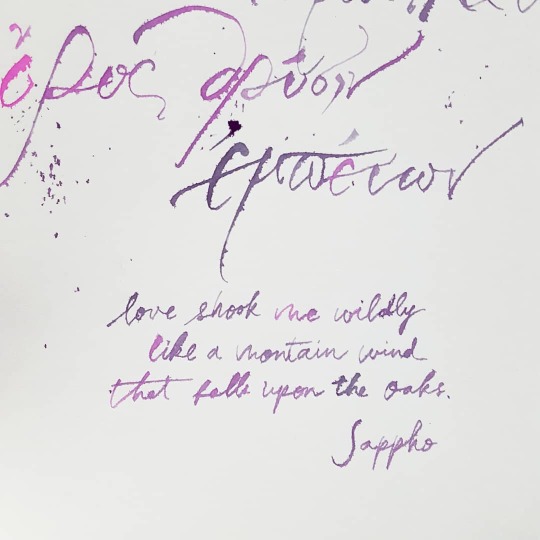


#Ψάπφω #Σαπφώ #Sappho
Ἔρος δ᾽ ἐτίναξέ μοι φρένας, ὠς ἄνεμος κὰτ ὄρος δρύσιν ἐμπέτων.
「愛は私の心を揺さぶる 山風がナラの木に吹きつけるように」
○Marumanマルマン sketch DRAWING PAPER <125> PADB5
●Daiso ダイソー インク調合セット(5本組) Pink/Grey
◎Cola pen (Folded pen)
#マルマン #Maruman #ダイソー #DAISO #インク調合セット #Colapen #FoldedPen #Lettering #HandLettering #LetteringChallenge #GesturalCalligraphy #καλλιγραφία #kalligraphie #kalligraphy #Calligraphy
2600年前のギリシャに生きた女性詩人サッポーによる愛の詩。
1 note
·
View note
Photo
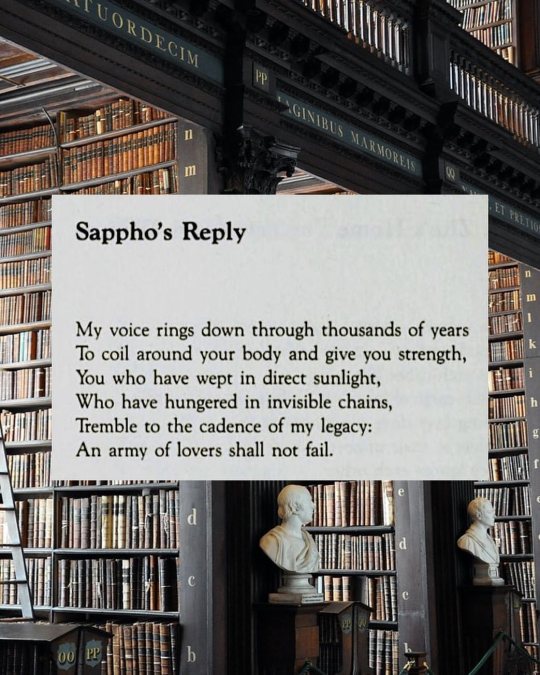
Sappho (/ˈsæfoʊ/; Greek: Σαπφώ Sapphō [sap. pʰɔ̌ː]; Aeolic Greek Ψάπφω Psápphō; c. Sappho is known for her lyric poetry, written to be sung while accompanied by a lyre. In ancient times, Sappho was widely regarded as one of the greatest lyric poets and was given names such as the "Tenth Muse" and "The Poetess". https://www.instagram.com/p/CCqc2ZXFQTo/?igshid=11rw15im6qzdq
0 notes
Photo

Δέδυκε μεν ά σελάννα καί Πληΐαδεσ, μέσαι δέ νύκτεσ πάρα δ᾽ έρχετ᾽ ώρα, έγω δέ μόνα κατεύδω - Ψάπφω https://www.instagram.com/p/B-tJDSCDVGj/?igshid=1qjmh0qrgpvlt
0 notes
Photo
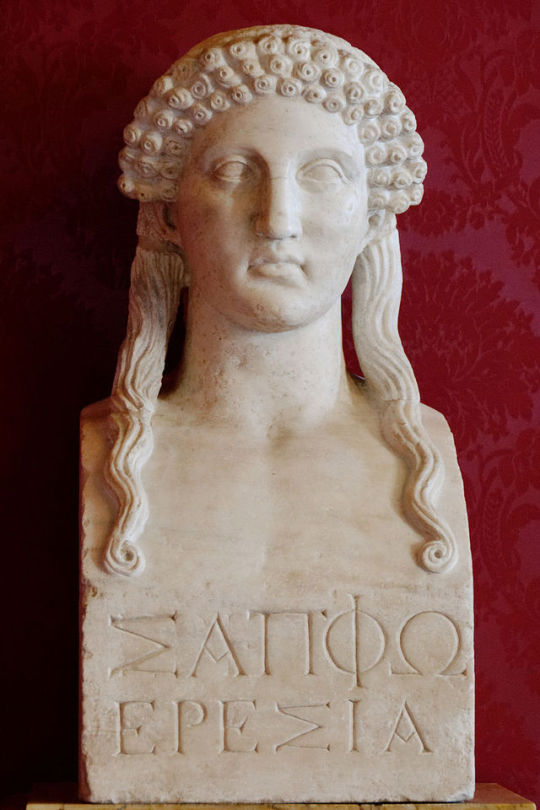
Safo de Mitilene, también conocida como Safo de Lesbos o simplemente Safo, (en griego, Σαπφώ; en eolio, Ψάπφω) (Mitilene, Lesbos, ca. 650/610 - Léucade, 580 a. C.) fue una poetisa griega. Más tarde los comentaristas griegos la incluyeron en la lista de los «nueve poetas líricos».
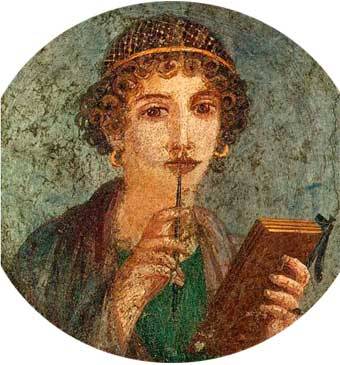
Perteneció a una sociedad llamada thiasos en donde se preparaba a las jóvenes para el matrimonio. Más adelante conforma la llamada «Casa de las servidoras de las Musas». Allí sus discípulas aprendían a recitar poesía, a cantarla, a confeccionar coronas y colgantes de flores, etc. A partir de sus poemas se suele deducir que Safo se enamoraba de sus discípulas y mantenía relaciones con muchas de ellas. Todo esto la ha convertido en un símbolo del amor entre mujeres.
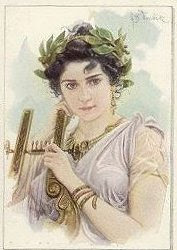
su obra, que al parecer constaba de nueve libros de extensión variada
2 notes
·
View notes
Text
You know what haunts me? Sappho in her native Lesbian (Aeolian) dialect is written as Ψάπφω which is Psap-pho and evening though it’s a script issue and the psi was really a strong initial S, I still want to read her name as PSap-fō
0 notes
Text
“Sappho (/ˈsæfoʊ/; Attic Greek Σαπφώ [sapːʰɔ̌ː], Aeolic Greek Ψάπφω, Psappho [psápːʰɔː]) was a Greek lyric poet, born on the island of Lesbos. The Alexandrians included her in the list of nine lyric poets. She was born sometime between 630 and 612 BCE, and it is said that she died around 570 BCE, but little is known for certain about her life. The bulk of her poetry, which was well-known and greatly admired through much of antiquity, has been lost; however, her immense reputation has endured through surviving fragments.” [Wikipedia]
When this post originally went up a few years ago, The Poet by Day didn’t have quite the following that is does now. Hence the repost. Both poet and organization are deserving of wide audience and big applause. / J.D., June 18, 2018.
Sunday: I began my dive into Dilys Wood’s Antarctica* (Greendale Press, 2008), spending my discretionary time engaged by this collection, which includes The South Pole Inn, a novella in verse.
“I dreamt I gave you the white continent
I wrapped it in white wedding wrap, embossed
with silver penguins and skiis …”
from Her Birthday Present in the section Love in a Freezing Climate: Four Poems
*****
“Wherever I look, the bacillus of melt
weakens the floes.”
from Future
DILYS WOOD is a poet, an editor and the founder (“convenor” as she might say) of the London-based Second Light Network of Women Poets (SLN), which produces the biannual ARTEMISpoetry and includes a publishing arm, Second Light Publishing. I first encountered Dilys thanks to Myra Schneider. That award-winning poet with eleven published collections is a consultant to SLN.
While Internet and email have a way of helping to cross borders and make affinity-based connections, closing the gaps in culture and miles – in this case some 5,500 miles as the crow flies – the tools are imperfect. It’s not the same as meeting, talking and observing in person. However, when you read what people write, when they risk themselves by putting their very souls on paper, you do get to know something about their values and passions. My strongest sense of Dilys was as the quiet persistent energy behind a women’s poetry collective and an apparently indefatigable advocate for women’s right – including women over 40 – to poetic voice.
At the point in which I first encountered Myra, Dilys and SLN, Dilys had collaborated on (mainly with Myra) four anthologies of women’s poetry. She had two collections of her own poetry published, Women Come to a Death (Databases, 1999) and Antarctica. That was, I think around 2010. Since that time, we are gifted through Dilys and Myra, Anne Stewart (poetry p f) and others on the SLN team with so many fine anthologies and magazines of women’s poetry, that I can hardly keep track.
This slideshow requires JavaScript.
Dilys is modest in presenting herself. Her Poet’s Page on SLN’s website says simply –
Dilys started writing poetry again after retiring from the Civil Service, where her jobs included being secretary of the Women’s National Commission. She shortly after founded Second Light, focussed on the needs of women reconnecting with writing after forty. Second Light Network developed into a support group and, on a small scale (though reviews suggest significant), publisher of women’s poetry. Together with her own writing (Antarctica, 2008; Women Come to a Death, Katabasis, 1997), Dilys has been the joint editor (mainly with Myra Schneider) of 4 womens poetry anthologies.
If The Poet by Day was a poem, its title would have to have the tagline after Dilys Wood. This site is not the product of collaboration and membership. Nonetheless, its commitment to sharing information on poets and poetry, including gifted if lesser-known poets, and promoting and encouraging poets who are marginalized by their gender, ethnicity, disability or age – is very definitely inspired by Dilys’ work and commitment to mature women and the work and commitment of Myra Schneider and the other SLN women as well as by my own love of poets and poetry and the whole of poesy history and culture.
This is Dilys in her own words as she “spoke” in a guest blog post here several years ago:
NEW SAPPHOS, CHALLENGES FOR WOMEN POETS
I run a network for women poets and naturally I want our members to be treated equitably, with recognition of any woman’s potential to be in the top flight of creative artists.
Some poets feel that ‘male and female he made them’ should not be an issue. I disagree because I want to celebrate and gain personal inspiration from the last fifty years. There has been a vastly increased involvement of women as students of poetry, published poets, book purchasers and consumers of ‘products’ such as poetry festivals. I also want it debated why this has not meant equality of treatment by journals.
Why do some leading journals publish fewer poems by women and use fewer women reviewers? What part is played by prejudice and what by our diffidence? Do we submit enough work and persist when submissions are rejected? Are there subtle shades of prejudice? Are we taken seriously on ‘women’s topics’ but not when writing about spiritual experience or politics?
A first step is to convince ourselves that there is no ceiling. Emily Dickinson surely lives up to the epithet ‘unique genius’? Her work is incredibly economical, dense, universal and deeply moving. She is totally original in style and thought. Her work alone ought to kill the slur that biology-based inferiority explains historical under-achievement.
So many more women have found now their voice. Let’s celebrate poets who excite us, from Emily Bronte (say) to Jorie Graham (say). We can also start thinking seriously about differences and about inflated reputations. Let’s be wary about ‘celebrity status’. This tends to narrows true appreciation. Read voraciously. Include lesser known poets and dead poets. You will be impressed by how much exciting writing is on offer.
– Dilys Wood
* “Antarctica,” Greendale Press, 2008 (all proceeds to Second Light Network funds). �5.95 through poetry p f (scroll down on the page to which this is linked)
© The New Sapphos, Dilys portrait, book cover art, Dilys Wood; © introduction, Jamie Dedes; Sapho embrassant sa lyre Jules Elie Delaunay (1828-1891), public domain
RELATED:
Antarctic, Dilys Wood (Greendale Press, 2008), reviewed by Myra Schneider, special for The Poet by Day
ABOUT
Testimonials
Disclosure
Facebook
Twitter
Poet and writer, I was once columnist and associate editor of a regional employment publication, currently run this site, The Poet by Day, an information hub for poets and writers. I am the managing editor of The BeZine published by The Bardo Group Beguines (originally The Bardo Group), a virtual arts collective I founded. I am a weekly contributor to Beguine Again, a site showcasing spiritual writers. My work is featured in a variety of publications and on sites, including: Levure littéraure, Ramingo’s Porch, Vita Brevis Literature,Compass Rose, Connotation Press, The Bar None Group, Salamander Cove, Second Light, I Am Not a Silent Poet, Meta / Phor(e) /Play, and California Woman. My poetry was recently read by Northern California actor Richard Lingua for Poetry Woodshed, Belfast Community Radio. I was featured in a lengthy interview on the Creative Nexus Radio Show where I was dubbed “Poetry Champion.”
* The BeZine: Waging the Peace, An Interfaith Exploration featuring Fr. Daniel Sormani, Rev. Benjamin Meyers, and the Venerable Bhikkhu Bodhi among others
“Every pair of eyes facing you has probably experienced something you could not endure.” Lucille Clifton
POET, TEACHER, INSPIRATION: Dilys Wood and the Latter-day Saphos "Sappho (/ˈsæfoʊ/; Attic Greek Σαπφώ , Aeolic Greek Ψάπφω, Psappho ) was a Greek lyric poet, born on the island of Lesbos.
0 notes